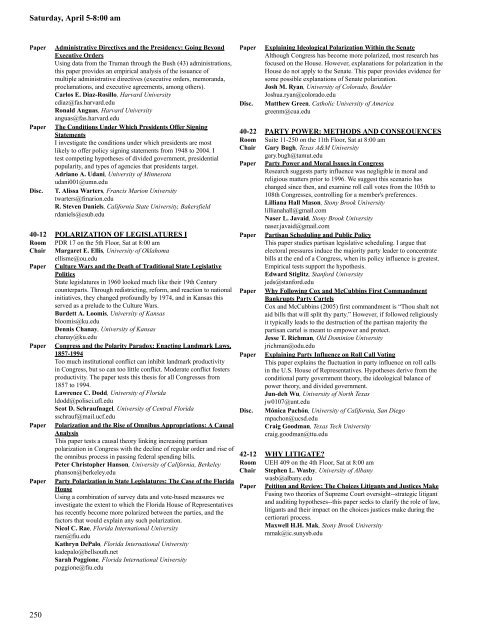2008 Conference Program - Midwest Political Science Association
2008 Conference Program - Midwest Political Science Association
2008 Conference Program - Midwest Political Science Association
Create successful ePaper yourself
Turn your PDF publications into a flip-book with our unique Google optimized e-Paper software.
Saturday, April 5-8:00 am<br />
Paper<br />
Paper<br />
Disc.<br />
Administrative Directives and the Presidency: Going Beyond<br />
Executive Orders<br />
Using data from the Truman through the Bush (43) administrations,<br />
this paper provides an empirical analysis of the issuance of<br />
multiple administrative directives (executive orders, memoranda,<br />
proclamations, and executive agreements, among others).<br />
Carlos E. Diaz-Rosillo, Harvard University<br />
cdiaz@fas.harvard.edu<br />
Ronald Anguas, Harvard University<br />
anguas@fas.harvard.edu<br />
The Conditions Under Which Presidents Offer Signing<br />
Statements<br />
I investigate the conditions under which presidents are most<br />
likely to offer policy signing statements from 1948 to 2004. I<br />
test competing hypotheses of divided government, presidential<br />
popularity, and types of agencies that presidents target.<br />
Adriano A. Udani, University of Minnesota<br />
udani001@umn.edu<br />
T. Alissa Warters, Francis Marion University<br />
twarters@fmarion.edu<br />
R. Steven Daniels, California State University, Bakersfield<br />
rdaniels@csub.edu<br />
40-12 POLARIZATION OF LEGISLATURES I<br />
Room PDR 17 on the 5th Floor, Sat at 8:00 am<br />
Chair Margaret E. Ellis, University of Oklahoma<br />
ellisme@ou.edu<br />
Paper Culture Wars and the Death of Traditional State Legislative<br />
Politics<br />
State legislatures in 1960 looked much like their 19th Century<br />
counterparts. Through redistricting, reform, and reaction to national<br />
initiatives, they changed profoundly by 1974, and in Kansas this<br />
served as a prelude to the Culture Wars.<br />
Burdett A. Loomis, University of Kansas<br />
bloomis@ku.edu<br />
Dennis Chanay, University of Kansas<br />
chanay@ku.edu<br />
Paper Congress and the Polarity Paradox: Enacting Landmark Laws,<br />
1857-1994<br />
Too much institutional conflict can inhibit landmark productivity<br />
in Congress, but so can too little conflict. Moderate conflict fosters<br />
productivity. The paper tests this thesis for all Congresses from<br />
1857 to 1994.<br />
Lawrence C. Dodd, University of Florida<br />
ldodd@polisci.ufl.edu<br />
Scot D. Schraufnagel, University of Central Florida<br />
sschrauf@mail.ucf.edu<br />
Paper Polarization and the Rise of Omnibus Appropriations: A Causal<br />
Analysis<br />
This paper tests a causal theory linking increasing partisan<br />
polarization in Congress with the decline of regular order and rise of<br />
the omnibus process in passing federal spending bills.<br />
Peter Christopher Hanson, University of California, Berkeley<br />
phanson@berkeley.edu<br />
Paper Party Polarization in State Legislatures: The Case of the Florida<br />
House<br />
Using a combination of survey data and vote-based measures we<br />
investigate the extent to which the Florida House of Representatives<br />
has recently become more polarized between the parties, and the<br />
factors that would explain any such polarization.<br />
Nicol C. Rae, Florida International University<br />
raen@fiu.edu<br />
Kathryn DePalo, Florida International University<br />
kadepalo@bellsouth.net<br />
Sarah Poggione, Florida International University<br />
poggione@fiu.edu<br />
Paper<br />
Disc.<br />
Explaining Ideological Polarization Within the Senate<br />
Although Congress has become more polarized, most research has<br />
focused on the House. However, explanations for polarization in the<br />
House do not apply to the Senate. This paper provides evidence for<br />
some possible explanations of Senate polarization.<br />
Josh M. Ryan, University of Colorado, Boulder<br />
Joshua.ryan@colorado.edu<br />
Matthew Green, Catholic University of America<br />
greenm@cua.edu<br />
40-22 PARTY POWER: METHODS AND CONSEQUENCES<br />
Room Suite 11-250 on the 11th Floor, Sat at 8:00 am<br />
Chair Gary Bugh, Texas A&M University<br />
gary.bugh@tamut.edu<br />
Paper Party Power and Moral Issues in Congress<br />
Research suggests party influence was negligible in moral and<br />
religious matters prior to 1996. We suggest this scenario has<br />
changed since then, and examine roll call votes from the 105th to<br />
108th Congresses, controlling for a member's preferences.<br />
Lilliana Hall Mason, Stony Brook University<br />
lillianahall@gmail.com<br />
Naser L. Javaid, Stony Brook University<br />
naser.javaid@gmail.com<br />
Paper Partisan Scheduling and Public Policy<br />
This paper studies partisan legislative scheduling. I argue that<br />
electoral pressures induce the majority party leader to concentrate<br />
bills at the end of a Congress, when its policy influence is greatest.<br />
Empirical tests support the hypothesis.<br />
Edward Stiglitz, Stanford University<br />
jeds@stanford.edu<br />
Paper Why Following Cox and McCubbins First Commandment<br />
Bankrupts Party Cartels<br />
Cox and McCubbins (2005) first commandment is “Thou shalt not<br />
aid bills that will split thy party.” However, if followed religiously<br />
it typically leads to the destruction of the partisan majority the<br />
partisan cartel is meant to empower and protect.<br />
Jesse T. Richman, Old Dominion University<br />
jrichman@odu.edu<br />
Paper Explaining Party Influence on Roll Call Voting<br />
This paper explains the fluctuation in party influence on roll calls<br />
in the U.S. House of Representatives. Hypotheses derive from the<br />
conditional party government theory, the ideological balance of<br />
power theory, and divided government.<br />
Jun-deh Wu, University of North Texas<br />
jw0107@unt.edu<br />
Disc. Mónica Pachón, University of California, San Diego<br />
mpachon@ucsd.edu<br />
Craig Goodman, Texas Tech University<br />
craig.goodman@ttu.edu<br />
42-12 WHY LITIGATE<br />
Room UEH 409 on the 4th Floor, Sat at 8:00 am<br />
Chair Stephen L. Wasby, University of Albany<br />
wasb@albany.edu<br />
Paper Peititon and Review: The Choices Litigants and Justices Make<br />
Fusing two theories of Supreme Court oversight--strategic litigant<br />
and auditing hypotheses--this paper seeks to clarify the role of law,<br />
litigants and their impact on the choices justices make during the<br />
certiorari process.<br />
Maxwell H.H. Mak, Stony Brook University<br />
mmak@ic.sunysb.edu<br />
250










